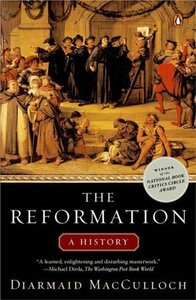You need to sign in or sign up before continuing.
Take a photo of a barcode or cover
challenging
informative
slow-paced
A detailed examination of a hugely long and complex series of historical events that have had such influence on the shape of Europe to this day.
MacCulloch writes clearly, bringing to life obscure theological debates and individual human emotions, politics and piety clashing across the continent, from Ireland to Transylvania. He also manages to include the pre-reformation background and the afterlife of the religious split in the colonies of the Protestant and Catholic powers. With no affiliation to either side, MacCulloch presents a fair and factual account that goes beyond Henry VIII and Bloody Mary.
Highly recommended.
MacCulloch writes clearly, bringing to life obscure theological debates and individual human emotions, politics and piety clashing across the continent, from Ireland to Transylvania. He also manages to include the pre-reformation background and the afterlife of the religious split in the colonies of the Protestant and Catholic powers. With no affiliation to either side, MacCulloch presents a fair and factual account that goes beyond Henry VIII and Bloody Mary.
Highly recommended.
This is a comprehensive history of the Reformation, rich in detail, and even-handed, teasing out the strands of the many varieties of both Catholic and Protestant Christianity that developed in Europe over the 15th to 17th century, and connecting this history meaningfully to our modern religious, national, gender identities. Something very special about MacCulloch's book is that he is able to synthesize many perspectives - theology, politics, social changes - putting it all together in a narrative that makes sense. I have always found this period of history confusing, and as a result, I had an oversimplified concept. This book is illuminating, both a challenge and a joy. Well worth the effort to read.
informative
slow-paced
challenging
informative
reflective
slow-paced
I haven't ever read a book on the topic and it is one that I've been interested in for some time so I was excited to read this book. I was a little disappointed. This is a lengthy book of over 700 pages and it is very, very detailed. It was difficult to keep up with all the names and places as the author covers the many different individuals who were part of the Reformation throughout Europe. It helps you realize how complex and big the Reformation was as it was the product of many individuals across many countries over a fairly long period of time. It would be helpful to have a good background in European history to better follow the book. The first two-thirds of the book is more of a chronological history and the last third covers some common themes and topics without the chronology. If you are looking for a high level overview of the Reformation, this is not the book for you.
If you want a one-stop history of the Reformation, this book is the place to go. Rather than tackling each area separately (German Reformation, Swiss Reformation, Catholic Reformation, etc.), MacCulloch provides us with a story that weaves all of these various plots together. In doing this some depth is sacrificed, so if you want to learn more about a particular figure or event you have to look elsewhere. But if you want to see the whole story, complete with background leading up to the Reformation and results of it, this book is great. My only complaint is that the Anabaptists seem to get short shrift, Menno Simons only gets one paragraph!
ISBN? – 9780140285345
Publishing - 2004 by Penguin Books (first published 2003)
General Subject/s? - History / Religion / Monarchy / War
Title? - The Reformation divided the whole of Europe.
General Analysis? - One of the best books I've read on the Reformation. It's clear and concise, and it is easy to find exactly what you're looking for within it. It covers the entirety of Europe, including all of the major reformers like Luther, Zwingli and Calvin. It also looks at the Papacy's role, which many books gloss over.
Recommend? – Yes
Publishing - 2004 by Penguin Books (first published 2003)
General Subject/s? - History / Religion / Monarchy / War
Title? - The Reformation divided the whole of Europe.
General Analysis? - One of the best books I've read on the Reformation. It's clear and concise, and it is easy to find exactly what you're looking for within it. It covers the entirety of Europe, including all of the major reformers like Luther, Zwingli and Calvin. It also looks at the Papacy's role, which many books gloss over.
Recommend? – Yes
Though this might be a touch dry and a trifle long for those who prefer their history books on the light side, it is still an excellent, informative read. MacCulloch does a wonderful job illuminating this transformative period in Western culture, and the relevance of this material to our modern world is striking.
After watching BBC's A History of Christianity, I felt that I had to search for one great work that Diarmaid MacCulloch has. Fortunately, I found this tome of the history of the Reformation and its implications in the Christian faith as a whole. I was a satisfying read for Catholics, I should say, with the obvious bias and focus on what happens outside of the Catholic Church.






